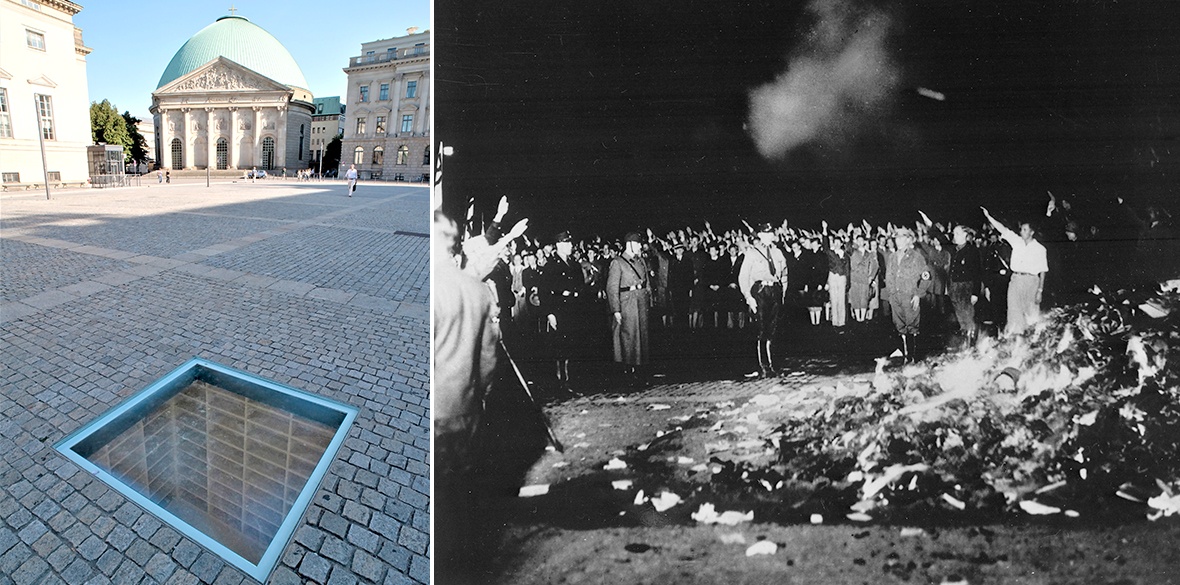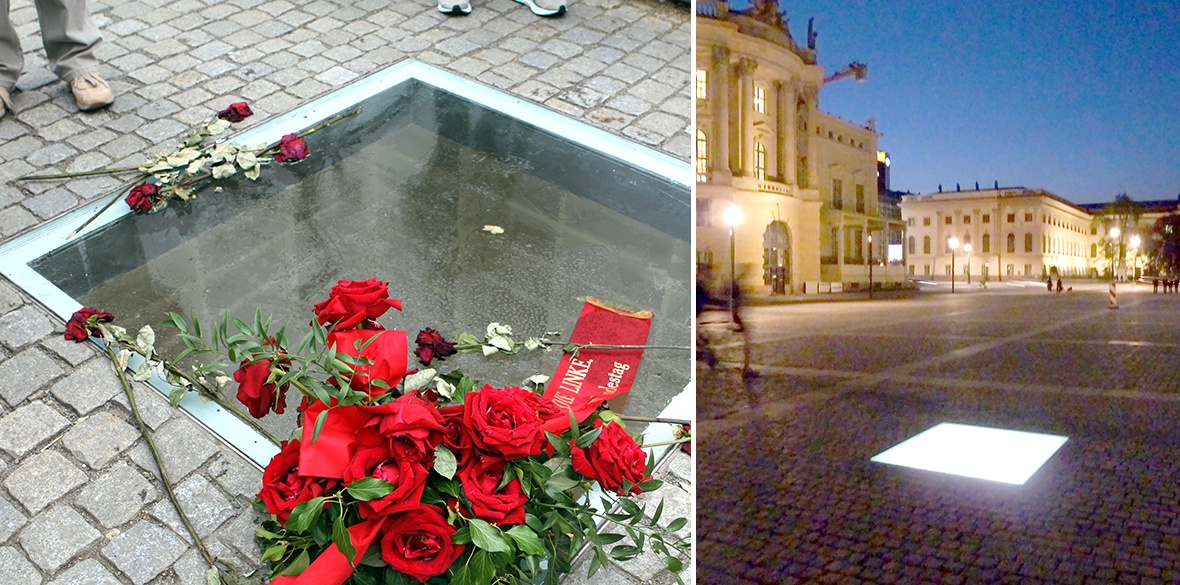This is the last article you can read this month
You can read more article this month
You can read more articles this month
Sorry your limit is up for this month
Reset on:
Please help support the Morning Star by subscribing here
ART IN THE OPEN
The Library
Bebelplatz, Berlin
THE evening of Wednesday May 10 1933 was bleak and rainy in Berlin.
Over 40,000 people had gathered in Kaiser Franz Josef Platz, now Bebelplatz, as Nazi German students from the adjoining Friedrich Wilhelms University (today Humboldt University), accompanied by many of the teaching staff, gleefully set fire to a large pile of over 20,000 books.
An SS military band played and close to midnight Joseph Goebbels, the German minister for propaganda addressed the gathering thus: “Entrust to the flames the intellectual garbage of the past.”
A similar event took place the next day in the nearby Opernplatz and another 34 book-burning orgies followed across Germany that month.
The practice continued up to and throughout WWII in most of the territories occupied by the Nazis.
Remarkably, Erich Kastner, who wrote thinly veiled satires of society’s descent into fascism, was there and saw his books being burned, and remembered Joseph Goebbels as he “vociferated and spouted, named the writers one by one and committed their books to the flames and oblivion. This was no Grand Inquisitor, but a minor irksome pyrotechnician…”
Photographs of the Kaiser Franz Josef Platz event survive and should have, at the time, provided ample warning as to the sinister direction German Nazism was taking society — Adolf Hitler had only been appointed chancellor three months earlier.
Book-burnings, however, are nothing new. In 213BC emperor Qin Shi Huang ordered the burning of all philosophy and history books from the provinces he had conquered; in the mid-16th century a Catholic bishop, Diego de Landa, led the burning of Mayan sacred hieroglyphic writings (now lost to humanity); in 364CE, the Roman Catholic emperor Jovian ordered the burning of the library of Antioch (southernmost Turkey); in 1497, followers of the Italian priest Girolamo Savonarola publicly burned in Florence copies of Boccaccio’s Decameron and all the works of Ovid they could find; Martin Luther also liked to burn a book or two in public and held a big session outside Wittenberg’s Elster Gate on December 10 1520; Voltaire’s works were burnt regularly in pre-revolutionary France and, closer to home, books by the philosopher Thomas Hobbes and other authors were burnt in Oxford University in 1683. More recently, in December 1946, when the Iranian army defeated the pro-Soviet Kurdish Republic of Mahabad in northern Iran it burned all Kurdish-language books that it found.
In 1993, 60 years after the Kaiser Franz Josef Platz ignonimy, 30 artists were invited to submit designs in a competition for a new memorial by the Berlin Senat for Building and Housing.
The winning entry, The Library, is an ingenious “inverted/negative form” design by sculptor Micha Ullman, at the time professor of Sculpture at the State Academy of Fine Arts in Stuttgart.
The memorial is a subterranean room (a 5x5x5 metres/16ftx16ftx16ft cube) where all of its four walls consist of empty bookshelves with enough space to hold all of the 20,000 books burnt on that infamous night.
The cellar is sealed with a glass plate set into the cobblestones that cover the square and you can easily walk past it in daylight without noticing.
After dark, however, its continuous illumination projects a ghostly white light upwards into the square, which is intriguing and attracts much attention.
Adjacent to it and inlaid into the cobblestones is a plaque with an engraved ominous quotation from Heinrich Heine’s play Almansor (1820): “That was a prelude, only there where books are burnt, do you end up burning people.”
Heine’s tragedy Almansor alludes to the Catholic archbishop of Toledo and eventually Grand Inquisitor Francisco Jimenez de Cisneros who, in 1499 — the time of the Reconquest — ordered, the burning of 5,000 books of Islamic theology, philosophy, history and the natural sciences. Much worse followed with the expulsion of the Jews.
In today’s climate of widespread and virulent political intolerance Heine’s words offer a caution as well as invite much needed reflection.













